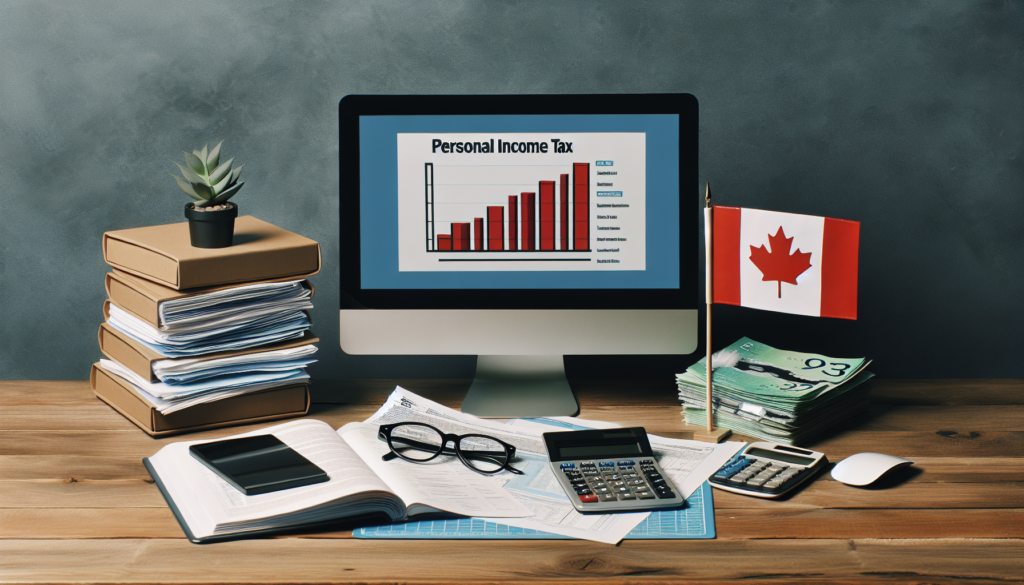Navigating the complexities of personal tax returns demands a keen understanding of Canadian taxation laws and regulations, an aspect where professional personal tax accountants, notably those at BOMCAS Edmonton Professional Tax Accountants, excel. These specialists provide invaluable assistance in accurately filing personal tax returns, ensuring individuals and businesses capitalize on deductions and avoid overpayment, thus optimizing financial outcomes [1]. The expertise of a personal tax accountant becomes particularly critical during significant life events such as marriage, divorce, moving, or entering retirement, highlighting the need for their guidance to navigate the ever-changing landscape of Canadian taxation efficiently [1].
With the landscape of income tax filing being intricate, involving various income sources such as employment income, self-employment, rental income, and more, the role of a proficient personal tax accountant in Edmonton becomes indispensable. They adeptly manage tax credits, deductions including those for charitable donations, medical expenses, and investment income, alongside RRSP contributions and numerous other aspects that constitute a comprehensive individual tax return [1]. This guide embarks on elucidating the vital role of expert accountants in managing personal tax returns, from understanding the stipulations for different income types to leveraging tax credits, ensuring accurate and advantageous tax filing outcomes for individuals in Edmonton.
Understanding Your Employment Income in Canada
Understanding the intricacies of employment income in Canada is pivotal for accurate tax reporting and optimization of potential refunds. This section delves into the various components of employment income and their respective reporting lines on the T1 personal income tax return, as guided by the expertise of BOMCAS Edmonton Professional Tax Accountants.
- Line 10100 – Employment Income: This line is designated for reporting salary, wages, and other remuneration received from an employer. It encompasses the gross employment income before deductions. The comprehensive nature of employment income means that it includes not just the basic salary but also bonuses, overtime, and other compensatory payments [2].
- Special Categories of Employment Income:
- Line 10120 – Commissions: Individuals earning commissions from employment report these earnings on this line. It specifically caters to those whose pay is primarily based on sales or performance metrics [2].
- Line 10130 – Wage-loss Replacement Contributions: Contributions made by an employer for wage-loss replacements are reported here. This includes amounts received under a wage-loss replacement plan due to illness, accidents, or disability not included in a T4 slip [2].
- Line 10400 – Other Employment Income: This line is for reporting various forms of employment income not captured under the standard employment income line. It includes research grants, clergy’s housing allowances, foreign employment income, royalties, employee profit sharing plan earnings, and more. This diversity in income types underscores the complexity of employment income reporting and the necessity for meticulous documentation [2].
Global Reporting Obligation and Deadlines:
- All worldwide income must be reported on the T1 personal income tax filing, emphasizing the global obligation of Canadian residents. This encompasses income from all sources, not just domestic employment [3].
- The standard deadline for filing personal income tax returns is April 30 of the following year. However, self-employed individuals and their spouses or common-law partners have until June 15 to file their returns. Notably, any taxes owed must be paid by April 30 to avoid interest charges, highlighting the importance of timely financial planning and filing [3].
By understanding these reporting requirements and leveraging the expertise of a personal tax accountant, such as those at BOMCAS Edmonton Professional Tax Accountants, individuals can navigate the complexities of employment income reporting with confidence, ensuring compliance and optimizing their financial position.
Self-Employment and Business Income in Canada
Navigating the intricacies of self-employment and business income in Canada involves a detailed understanding of various forms and deductions. At the forefront, the T2125 form plays a pivotal role, utilized by individuals with self-employed income or income from a small business not incorporated. This form is integral for reporting on a personal tax return (T1), underscoring the necessity for meticulous documentation and understanding of taxable income and deductions [4].
Key Components of T2125 Form:
- Identification and Business Activities: This section captures basic identification details alongside internet business activities, providing a snapshot of the business’s digital footprint [4].
- Income and Deductions: It details gross income, net income before adjustments, and allows for the deduction of relevant business expenses such as home office expenses, meals, entertainment, and more. This section is crucial for accurately calculating taxable income [4].
- Detailed Deductions: Includes specific categories like motor vehicle expenses, requiring information on the make/model, kilometers driven for business purposes, and total expenses incurred. It also covers Capital Cost Allowance (CCA) for assets exceeding $30,000 before taxes, highlighting the depth of allowable deductions [4].
Deductible Business Expenses:
- Operating Costs: These encompass a wide array of expenses from advertising, office supplies, and bank fees to more significant costs like business-use-of-home expenses and vehicle expenses [5].
- Professional Services: Management and administration fees, insurance costs, and interest on money borrowed for business purposes are also deductible, offering avenues to reduce taxable income [4].
Benefits of Professional Tax and Accounting Services:
- Compliance and Financial Efficiency: Professional services ensure adherence to regulatory frameworks and maximize deductions, significantly reducing the tax burden [6].
- Risk Mitigation and Strategic Planning: They provide comprehensive risk assessments and financial forecasting, crucial for navigating uncertain economic landscapes [6].
- Time and Resource Optimization: Outsourcing to professional firms can save on costs associated with in-house financial staff, streamlining bookkeeping and administrative tasks [7].
For self-employed individuals and small business owners in Edmonton, leveraging the expertise of a personal tax accountant, such as those at BOMCAS Edmonton Professional Tax Accountants, can be instrumental. These professionals not only assist in accurately filling out the T2125 form but also provide strategic advice on optimizing deductions, ensuring compliance, and enhancing financial efficiency. Their in-depth knowledge of Edmonton’s distinct taxation landscape and access to advanced accounting tools further empower businesses to navigate the complexities of self-employment and business income with confidence.
Investment Income and Capital Gains in Canada
In the realm of personal taxation, understanding the intricacies of investment income and capital gains is paramount for optimizing tax returns. The Edmonton Personal Income Tax Accountant team at BOMCAS Edmonton Professional Tax Accountants stands ready to guide clients through these complexities, ensuring that every opportunity for tax savings is seized.
Types of Investment Income and Reporting Lines:
- Dividends from Taxable Canadian Corporations: Reported on Lines 12000 and 12010, dividends are a form of income generated from investments in Canadian companies [15].
- Interest and Other Investment Income: This includes foreign interest and dividend income, which should be reported on Line 12100. It’s crucial for investors to accurately report these incomes to adhere to Canadian taxation laws [15].
Capital Gains and Losses:
- Reporting and Calculation: Taxable capital gains or losses from the sale or transfer of capital property are reported on Line 12700. Schedule 3 is used to calculate the taxable amount, ensuring precision in reporting [15][16].
- Tax Implications: Capital gains are considered 50% taxable and are added to one’s income, which is then taxed at the applicable personal tax rate. Conversely, capital losses can offset capital gains, with the provision to carry unused losses back for three years or forward to future years, offering strategic tax planning opportunities [17].
- Record Keeping: Investors are advised to keep records and documents related to the acquisition and disposition of investments for at least 6 years, a practice that BOMCAS Edmonton Personal Income Tax Accountants strongly advocate to facilitate accurate and compliant tax filings [17].
Strategic Planning for Capital Gains:
- Tax Optimization Strategies: Planning for capital gains involves strategies such as selling losing stocks to offset gains or contributing to an RRSP to lower the taxable income. These methods can significantly reduce the tax burden, underscoring the importance of strategic financial planning [17].
- New Taxation Rules for 2023: A pivotal change beginning on January 1, 2023, is the treatment of profits from selling a housing unit, or a ‘right to purchase’ a housing unit in Canada, as business income instead of a capital gain if the property was owned for less than 365 consecutive days prior to selling. This shift emphasizes the need for investors to stay informed and adapt their strategies accordingly [18].
The Edmonton Personal Income Tax Accountant team at BOMCAS Edmonton Professional Tax Accountants is adept at navigating the complex landscape of investment income and capital gains taxation. Their expertise not only ensures compliance with Canadian tax laws but also empowers clients to make informed decisions that enhance their financial well-being.
Rental Income Reporting in Canada
In the realm of Canadian taxation, rental income reporting is a critical aspect that requires meticulous attention to detail. The guidance provided by the CRA’s T4036 guide on Rental Income is an indispensable resource for individuals and Edmonton Personal Income Tax Accountants at BOMCAS Edmonton Professional Tax Accountants, ensuring compliance and optimization of tax obligations related to rental properties [19].
Key Aspects of Rental Income Reporting:
- Types of Rental Income:
- Rental Operation Income refers to earnings from services provided within the rental property, including utilities, heat, and security [19].
- Direct Rental Income encompasses the rent collected from tenants for the use of a residential or commercial property [22].
- Deductible Expenses:
- Current Expenses such as advertising, insurance, and repairs are fully deductible in the tax year they are incurred [22][23].
- Capital Expenses like renovations or new roofs add to the property’s value and are depreciated over time, impacting the Undepreciated Capital Cost (UCC) [22][23].
- Special Considerations for Non-Residents:
- Non-residents earning rental income from Canadian properties must be aware of Form NR6 and the Subsection 216(1) Late-filing Policy, highlighting the need for timely and accurate reporting to avoid penalties [20].
Capital Cost Allowance (CCA) and Property Types:
- CCA Deduction: Capital Cost Allowance allows for the deduction of the cost of depreciable property, such as buildings and equipment, over several years. This is crucial for reducing taxable income derived from rental operations [19].
- Property Classifications:
- Multiple-unit Residential Buildings (MURB): Classified under Class 31 or 32, these properties have at least two self-contained residential units and are subject to specific CCA rules [19].
- Zero-emission Passenger Vehicles (ZEPV): Included in Class 54, these vehicles are owned by the taxpayer for rental operations and offer unique tax advantages [19].
Tax Implications and Strategies:
- Rental Income Taxation: The income tax rate applied to rental income is the same as the individual’s marginal tax rate. For properties owned jointly, the income and tax obligations are divided according to the ownership share [21][24].
- Losses and Gains: Rental losses, where expenses exceed income, can offset other sources of income on personal tax returns, providing a strategic advantage in tax planning. Conversely, the sale of a rental property may result in capital gains or losses, with implications for previously claimed CCA [21][23].
Leveraging the expertise of Edmonton Personal Income Tax Accountants at BOMCAS Edmonton Professional Tax Accountants, individuals can navigate the complexities of rental income reporting with confidence. These professionals ensure that every available deduction is utilized, compliance is maintained, and strategic tax planning is employed to optimize financial outcomes for rental property owners [19][20][21][22][23][24].
Claiming Deductions and Credits in Canada
In the pursuit of optimizing personal tax returns, individuals can harness a variety of deductions and credits, effectively reducing their tax liability. The expertise of Edmonton Personal Income Tax Accountants at BOMCAS Edmonton Professional Tax Accountants plays a pivotal role in identifying and applying these financial levers.
Deductions and Credits Overview:
- Home Renovation Credits: Eligible for the Home Accessibility Tax Credit (HATC) and the Multigenerational Home Renovation Tax Credit (MHRTC), catering to renovations that improve accessibility or accommodate multiple generations under one roof [18].
- Personal and Family Deductions:
- Disability Tax Credit and Medical Expenses for individual needs [25][28].
- Family, Child Care, and Caregivers Deductions and Credits for claim amounts related to children, eligible dependants, and spouse or common-law partner [25].
- Canada Child Benefit and Child Disability Benefit, providing tax-free monthly payments to eligible families [27].
- Education and Employment:
Maximizing Tax Efficiency:
- Strategic Planning: Edmonton Personal Income Tax Accountants assist in strategic planning, ensuring clients utilize all applicable deductions and credits, such as pension and savings plans deductions (RRSP, RPP, PRPP) and the First Home Savings Account deduction [26].
- Avoiding Common Pitfalls:
- Leveraging Carryforwards and Transfers:
The landscape of Canadian taxation presents numerous opportunities for individuals to reduce their tax obligations through a meticulous application of deductions and credits. With the guidance of Edmonton Personal Income Tax Accountants at BOMCAS Edmonton Professional Tax Accountants, taxpayers can navigate this complex terrain, ensuring they achieve the most favorable financial outcomes. Their deep understanding of the nuances in Canadian taxation laws enables them to identify and leverage every available tax-saving strategy, from the basic personal amount adjustments [35] to the nuanced application of the Simplified Northern Residents Travel Deduction [36].
Navigating Alberta’s Tax Credits
Alberta offers a unique tax landscape that provides numerous benefits for its residents and businesses, ensuring a financially conducive environment for growth and prosperity. The Edmonton Personal Income Tax Accountant team at BOMCAS Edmonton Professional Tax Accountants is well-versed in navigating these tax credits and incentives, making them an indispensable resource for individuals and businesses aiming to optimize their tax positions.
- Individual Tax Credits and Benefits:
- Alberta Child and Family Benefit (ACFB): A pivotal support mechanism for lower-income families, the ACFB offers direct financial assistance, with the benefit amount scaling up with the number of children in the family. This initiative underscores Alberta’s commitment to supporting its residents through substantial financial aids [37].
- Business Tax Incentives:
- Capital Investment Tax Credit (CITC):
- Eligibility: Targets Alberta businesses engaged in manufacturing, processing, or tourism infrastructure activities for a minimum of 120 consecutive days within a 12-month period, promoting sustained economic activities [38].
- Benefits: Offers a non-refundable tax credit of 10% on eligible capital expenditures, up to a maximum of $5 million per calendar year, with the flexibility of a 10-year carry-forward period. This initiative is designed to stimulate timely capital investments in key sectors [38].
- Economic Impact and Compliance: The CITC incorporates economic impact assessment criteria such as investment size, employment impacts, and the inclusion of under-represented groups. It mandates regular progress reports and adherence to the Freedom of Information and Privacy (FOIP) Act, ensuring transparency and accountability [38].
- Capital Investment Tax Credit (CITC):
- Upcoming Changes in 2024:
- Alberta is set to reintroduce the provincial fuel tax, adjust the income tax bracket, and reinforce the Taxpayer Protection Act. These changes are indicative of Alberta’s dynamic approach to taxation, aiming to balance fiscal responsibilities with the economic welfare of its residents and businesses [14].
Leveraging the expertise of Edmonton Personal Income Tax Accountants at BOMCAS Edmonton Professional Tax Accountants enables individuals and businesses to navigate Alberta’s tax credits effectively. Their deep understanding of the provincial tax environment ensures that clients can capitalize on available benefits while adhering to regulatory requirements, thereby optimizing their financial outcomes.
Avoiding Common Filing Mistakes in Canada
To ensure accuracy and compliance in tax filing, the Edmonton Personal Income Tax Accountant team at BOMCAS Edmonton Professional Tax Accountants highlights common filing mistakes to avoid:
- Comprehensive Income Reporting:
- Deductions and Expenses:
- Non-Claimable Expenses: Understand what cannot be claimed, such as personal loans to family members, funeral, and wedding expenses [30].
- Supporting Documentation: Maintain detailed records of income and expenses. Reconciling your income with independent sources can verify the accuracy of your records [30].
- Tax Filing and Payments:
- Partial Payments: When making a partial payment, ensure it’s correctly noted on your paper return. This will be reflected as a “payment on filing” on your notice of assessment [30].
- Record Keeping: Hold onto all tax-related documents for six years from the end of the last tax year they relate to, as required by the CRA [31].
- Strategic Considerations:
- Interpretation of Rules: Avoid overly favorable interpretations of tax rules that might lead to claiming ineligible expenses [31].
- Adjustments and Corrections: Utilize the opportunity to correct errors or omissions by filing a T1-Adjustment. This proactive approach can mitigate potential penalties and interest [31].
- Personal Information:
- Marital Status: Accurately report your marital status, as this affects eligibility for certain benefits like the GST/HST Credit or Canada Child Benefit [32].
- Dealing with the CRA: Approach interactions with the CRA calmly. Misunderstandings or providing incorrect information due to nervousness can complicate your tax matters [31].
By adhering to these guidelines, taxpayers can navigate the complexities of tax filing with greater confidence and efficiency. The Edmonton Personal Income Tax Accountant team at BOMCAS Edmonton Professional Tax Accountants is dedicated to assisting clients in avoiding these common pitfalls, ensuring a smooth and compliant tax filing process.
Utilizing BOMCAS Edmonton Professional Tax Services
BOMCAS Edmonton Professional Tax Accountants stand out as a beacon of comprehensive tax and accounting solutions, catering to a wide array of needs for individuals and businesses alike. Their services span across various domains, ensuring that every financial and tax-related requirement is meticulously addressed.
Key Services Offered by BOMCAS Edmonton:
- Tax Preparation and Filing: Specializing in both individual and corporate tax returns, BOMCAS Edmonton ensures accurate and compliant tax filing, thereby minimizing audit risks and maximizing potential refunds [29][41][43].
- Personal Tax Returns
- Corporate Tax Returns
- GST/HST Preparation and Filing
- Bookkeeping and Financial Record Keeping: Offering top-notch bookkeeping services, BOMCAS Edmonton aids businesses in maintaining precise financial records. This is crucial for effective planning, budget forecasting, and expense analysis [41][45].
- Monthly Bookkeeping
- Financial Statement Preparation
- QuickBooks Setup and Support [46]
- Payroll Services: Efficient management of payroll processes, including gross pay calculation, tax withholdings, and contributions towards medical, retirement, and health insurance plans [41][46].
Specialized Services Tailored to Diverse Industries:
BOMCAS Edmonton’s expertise isn’t limited to generic accounting services. They exhibit prowess in catering to specialized industries, offering tailored solutions that resonate with the unique demands of each sector [42]. A glimpse into their specialized services includes:
- Real Estate and Non-Resident Tax Services: From handling real estate accounting intricacies to navigating non-resident tax obligations, BOMCAS Edmonton provides a comprehensive suite of services to ensure clients stay compliant while optimizing their tax positions [42][44].
- Agriculture, Food Services, and More: Whether it’s farm tax and accounting services or navigating the complex tax landscape for the food services industry, BOMCAS Edmonton is equipped to offer expert guidance and solutions [42][46].
- Technology, Construction, and Cannabis: Recognizing the evolving nature of these industries, BOMCAS Edmonton delivers cutting-edge tax and accounting strategies to support growth and sustainability [42].
Accessibility and Personalized Services:
BOMCAS Edmonton prides itself on its widespread presence across multiple locations, ensuring accessibility to a broad spectrum of clients. Their commitment to delivering personalized services based on individual needs underscores their dedication to client satisfaction [40][43]. Contact information for their Edmonton office is readily available for those seeking professional tax and accounting assistance [42].
By leveraging the extensive services and industry-specific expertise of BOMCAS Edmonton Professional Tax Accountants, individuals and businesses can navigate the complexities of taxation and accounting with confidence, ensuring compliance, maximizing financial efficiency, and fostering growth in their respective domains.
Preparing for Next Year’s Tax Season in Edmonton Alberta Canada
For taxpayers in Edmonton, Alberta, preparing for the next tax season with the guidance of Edmonton Personal Income Tax Accountants at BOMCAS Edmonton Professional Tax Accountants can streamline the process, ensuring timely compliance and optimization of returns. Here are key steps and deadlines to consider:
Key Deadlines:
- Filing Deadline for Personal Income Tax Returns: April 30, 2024. If this date falls on a weekend, the deadline is extended to the next business day [47].
- Extended Deadline for 2022 Returns: Since April 30, 2023, falls on a Sunday, returns filed or postmarked by May 1, 2023, are considered timely [36].
- Start of Filing Season: The 2022 income tax and benefit return filing season begins on February 20, 2023 [36].
Steps for Efficient Tax Filing:
- Sign Up for Direct Deposit: Accelerate refunds by signing up for direct deposit with the CRA, avoiding delays associated with paper cheques [36][18].
- Utilize Digital Services:
- Payment Arrangement Calculator: Available on My Account and My Business Account for flexible payment options [36].
- Tax-Filing Season Promotional Kit: Leverage the CRA’s kit for answers to common tax-filing questions [18].
- Taxology Podcast: A new resource introduced by the CRA to demystify the world of taxes for taxpayers [18].
- Understanding Penalties: Late filing can result in a 5% charge on the owed amount, plus an additional 1% for each full month the return is late, up to 12 months [14].
Benefits of Filing with Professional Assistance:
- Optimizing Returns: The average tax refund in 2022 was $2,092, highlighting the potential benefits of accurate and optimized filing [36].
- Compliance and Benefits: Even with no income or tax-exempt income, filing is necessary to receive benefits and credits [36].
- Indigenous Peoples Support: The CRA provides specific information and resources for Indigenous Peoples, ensuring they access all available benefits and credits [48].
By collaborating with Edmonton Personal Income Tax Accountants at BOMCAS Edmonton Professional Tax Accountants, taxpayers in Edmonton can navigate the complexities of tax preparation with confidence. These professionals ensure that every step from understanding key deadlines to leveraging CRA’s digital resources is meticulously managed, securing optimal financial outcomes for their clients.
Why you need a professional tax accountants in Edmonton for personal tax returns
Engaging the services of a professional tax accountant in Edmonton for personal tax returns brings a plethora of advantages that are pivotal for both compliance and financial optimization. Below are the key benefits that underscore the importance of this professional partnership:
- Strategic Financial Planning and Personalized Tax Preparation:
- Expertise in Canadian Tax Legislation: Professional tax accountants, like those at Taxxlution Accounting Professionals and BOMCAS Edmonton Professional Tax Accountants, possess an in-depth understanding of the complexities of Canadian tax laws. This knowledge is leveraged to devise strategic plans that aim to minimize tax liabilities while maximizing returns for their clients [6][29].
- Customized Tax Services: Offering a range of personalized services, including tax preparation, planning, and filing, these professionals ensure that every client benefits from an approach tailored to their unique financial situation. This bespoke service extends to estate planning and trusts, ensuring comprehensive financial oversight [29].
- Time Savings and Stress Reduction:
- Efficiency in Handling Tax Matters: The process of preparing and filing taxes can be both time-consuming and overwhelming for individuals. By entrusting these tasks to a professional tax accountant, clients can reallocate their time and focus towards other important aspects of their lives or businesses, thus achieving a better work-life balance [29][49].
- Reducing the Burden of Tax Filing: The meticulous attention to detail required for accurate tax filing is managed efficiently by tax accountants, significantly alleviating the stress associated with tax season. This peace of mind comes from knowing that one’s tax affairs are in capable hands, ensuring compliance and accuracy [29].
- Expert Advisory and Insightful Guidance:
- Minimizing Tax Liability and Maximizing Deductions: Through their expertise and experience, tax accountants provide invaluable advice on how to effectively reduce tax liabilities. They guide clients through the maze of available deductions and credits, ensuring that all opportunities for financial savings are explored and utilized [29].
- Trusted Advisors for Financial and Business Planning: Beyond tax preparation, professional tax accountants serve as trusted advisors, offering insights and assistance with business planning and networking. Their guidance is instrumental in tackling complex tax issues, contributing to the strategic growth and financial health of their clients’ ventures [49].
In conclusion, the decision to hire a professional tax accountant in Edmonton, such as those at BOMCAS Edmonton Professional Tax Accountants, is a strategic investment in one’s financial well-being. The benefits extend beyond mere tax compliance, encompassing strategic financial planning, personalized service, time savings, stress reduction, and expert advisory. This professional partnership empowers individuals and businesses to navigate the complexities of taxation with confidence, ensuring optimal financial outcomes.
Why BOMCAS Edmonton Accountants are the best Personal Tax Accountants in the City
Throughout this comprehensive exploration, the critical role of professional tax accountants, especially those part of the team at BOMCAS Edmonton Professional Tax Accountants, has been emphasized. Their expertise not only simplifies the daunting task of tax compliance and optimization for individuals and businesses in Edmonton but also ensures that clients benefit from strategic financial planning and maximize their returns. This partnership extends beyond mere transactional interactions, evolving into a pivotal cornerstone for achieving financial health and compliance with Canadian tax laws.
Navigating the multifaceted domain of tax preparation, from personal income to business and investment tax intricacies, demands the nuanced understanding that Edmonton Personal Income Tax Accountants at BOMCAS possess. Their ability to guide taxpayers through the complex landscape, ensuring every available deduction is utilized and financial outcomes are optimized, is invaluable. For anyone seeking to navigate the complexities of tax season with confidence, discovering how BOMCAS is Edmonton Personal Tax Accountant becomes an essential step in safeguarding one’s financial future.
Conclusion
As taxpayers in Edmonton and across Canada navigate the evolving landscape of taxation, the expertise of Edmonton Personal Income Tax Accountants at BOMCAS Edmonton Professional Tax Accountants becomes increasingly indispensable. The upcoming changes in taxation for 2024 underscore the necessity for strategic tax planning and informed decision-making:
- Tax Changes and Implications for 2024:
- Income-based Taxes and Contributions: Reflecting efforts to bolster social safety nets, income-based taxes and contributions will see an increase [14].
- CPP Enhancements: The introduction of CPP2 and the increase in maximum pensionable earnings up to $73,200 in 2024 and $79,400 in 2025 [14].
- Employment Insurance (EI): Premium rates and the maximum insurable earnings for EI will rise, impacting both employers and employees [14].
- Carbon Tax Escalation: The carbon tax will climb from $65 to $80 per tonne, affecting costs across various sectors [14].
- Excise Taxes on Alcoholic Beverages: An increase in excise taxes on alcoholic beverages will take effect, potentially influencing consumer prices [14].
- Digital Services Tax (DST): Targeting large online companies, the DST aims to ensure fair taxation in the digital economy [14].
- Provincial Tax Adjustments:
- British Columbia: Increases in the carbon tax and expansion of the speculation and vacancy tax [14].
- Manitoba: Adjustments in personal income tax brackets and fuel tax, alongside a cut in the Health and Post-Secondary Education Employer Tax [14].
- Ontario: Extension of the provincial gas tax cut and an increase in Toronto’s vacant home tax [14].
- Quebec: Reduction in income tax rates for the first two brackets, with increases in the QPP tax rate and maximum insurable earnings [14].
- Saskatchewan: The small business tax rate will double from one to two percent [14].
- Atlantic Provinces: Various exemptions and reductions in home heating carbon tax, alongside changes in income tax structures and fuel taxes [14].
In light of these changes, the role of professional tax accountants extends beyond annual tax filing. They serve as strategic advisors, helping individuals and businesses adapt to new tax regulations, optimize tax positions, and plan for future financial stability. The Edmonton Personal Income Tax Accountants at BOMCAS Edmonton Professional Tax Accountants, with their comprehensive understanding of both federal and provincial tax changes, are equipped to offer tailored advice and solutions. Their expertise in navigating the complexities of Canadian taxation ensures that clients are well-prepared to meet their tax obligations while maximizing their financial potential.
FAQs
References
[1] – https://taxedmonton.ca/guide-to-personal-tax-accountant-services-in-edmonton/
[2] – https://www.canada.ca/en/revenue-agency/services/tax/individuals/topics/about-your-tax-return/tax-return/completing-a-tax-return/personal-income/employment-self-employment-income.html
[3] – https://turbotax.intuit.ca/tips/taxes-for-new-canadians-step-by-step-guide-to-filing-your-tax-return-14177
[4] – https://www.youtube.com/watch?v=sJS9gayA8ss
[5] – https://turbotax.intuit.ca/tips/popular-canadian-tax-benefits-deductions-and-credits-in-2023-14180
[6] – https://www.taxxlution.com/blogs/tax-accountant-edmonton-blog/1191882-5-benefits-of-tax-and-accounting-services
[7] – https://taxedmonton.ca/corporate-tax-accountant-and-their-benefits-in-edmonton/
[8] – https://taxcounting.com/blog/the-benefits-of-hiring-accounting-firms-for-small-businesses-in-edmonton/
[9] – https://www.canada.ca/en/revenue-agency/services/tax/businesses/small-businesses-self-employed-income.html
[10] – https://www.wealthsimple.com/en-ca/learn/self-employed-taxes-canada
[11] – https://www.nerdwallet.com/ca/personal-finance/about-self-employed-taxes
[12] – https://turbotax.intuit.ca/tips/guidelines-for-reporting-self-employment-income-6387
[13] – https://turbotax.intuit.ca/tips/the-beginners-guide-to-self-employed-tax-preparation-2-14423
[14] – https://www.ctvnews.ca/business/what-you-need-to-know-to-prepare-for-2024-tax-filing-season-1.6729920
[15] – https://www.canada.ca/en/revenue-agency/services/tax/individuals/topics/about-your-tax-return/tax-return/completing-a-tax-return/personal-income/investment-income.html
[16] – https://www.canada.ca/en/revenue-agency/services/tax/individuals/topics/about-your-tax-return/tax-return/completing-a-tax-return/personal-income/line-12700-capital-gains/calculating-reporting-your-capital-gains-losses.html
[17] – https://www.hrblock.ca/blog/6-things-to-know-about-capital-gains
[18] – https://www.canada.ca/en/revenue-agency/news/newsroom/tax-tips/tax-filing-season-media-kit/tax-questions-answers.html
[19] – https://www.canada.ca/en/revenue-agency/services/forms-publications/publications/t4036/rental-income.html
[20] – https://www.canada.ca/en/revenue-agency/services/tax/international-non-residents/information-been-moved/rental-income-non-resident-tax.html
[21] – https://www.ig.ca/en/insights/tax-on-rental-income
[22] – https://turbotax.intuit.ca/tips/tax-deductions-on-rental-properties-6382
[23] – https://www.linkedin.com/pulse/how-save-taxes-rental-income-canada-lakshay-gandhi-cpa-cga-pzmuc
[24] – https://realestatetaxtips.ca/how-rental-income-is-taxed-in-canada/
[25] – https://www.canada.ca/en/revenue-agency/services/tax/individuals/topics/about-your-tax-return/tax-return/completing-a-tax-return/deductions-credits-expenses.html
[26] – https://www.canada.ca/en/revenue-agency/services/tax/individuals/topics/about-your-tax-return/tax-return/completing-a-tax-return/deductions-credits-expenses/deductions-credits-expenses.html
[27] – https://www.nerdwallet.com/ca/personal-finance/tax-credits-in-canada
[28] – https://www.forbes.com/advisor/ca/personal-finance/tax-credits-in-canada/
[29] – https://accountantsedmonton.ca/services/tax/personal-tax-accountant-edmonton/
[30] – https://www.canada.ca/en/revenue-agency/news/newsroom/tax-tips/tax-tips-2024/five-common-mistakes-to-avoid-at-tax-time.html
[31] – https://www.linkedin.com/pulse/10-mistakes-avoid-when-filing-your-personal-tax-green-cpa-ca-mba-17ioc
[32] – https://money.ca/taxes/the-biggest-mistakes-canadians-make-on-their-taxes-and-how-to-fix-them
[33] – https://www.canada.ca/en/revenue-agency/services/forms-publications/tax-packages-years/general-income-tax-benefit-package/alberta/5009-pc.html
[34] – https://www.canada.ca/en/revenue-agency/services/forms-publications/tax-packages-years/archived-general-income-tax-benefit-package-2022/alberta/5009-pc/information-residents-alberta.html
[35] – https://media.icims.com/training/iForms%20Library/Candidate%20Management/Onboarding%20Solution/Alberta%20Personal%20Tax%20Credit.pdf
[36] – https://www.canada.ca/en/revenue-agency/news/2023/02/whats-new-and-what-to-remember-when-filing-your-taxes-in-alberta-this-year.html
[37] – https://www.alberta.ca/personal-income-tax
[38] – https://open.alberta.ca/dataset/483a9010-a557-414a-a12c-2bea3be9acce/resource/f27c7d75-7ad6-4da8-ba47-c25bb8967c2c/download/citc-program-guide-2019-01.pdf
[39] – https://www.theglobeandmail.com/investing/personal-finance/article-tax-filing-mistakes-cra/
[40] – https://albertataxservices.ca/accountants-in-edmonton-and-their-benefits/
[41] – https://medium.com/@EdmontonAccountant/benefits-of-hiring-a-bomcas-edmonton-accountant-643017571f32
[42] – https://bomcas.ca/the-benefits-of-an-accounting-firm/
[43] – https://medium.com/@EdmontonAccountant/bomcas-accountant-can-help-you-understand-your-financial-status-e54b55cbcc9b
[44] – https://taxedmonton.ca/services/
[45] – https://sites.google.com/view/bomcasalberta/tax-services-edmonton
[46] – https://bomcasaccounting.ca/
[47] – https://atsaccountinginc.com/taxes/what-do-you-need-to-know-to-file-your-personal-income-tax-return-in-alberta/
[48] – https://turbotax.intuit.ca/tips/2023-canada-tax-checklist-what-documents-do-i-need-to-file-my-taxes-14216
[49] – https://atsaccountinginc.com/accounting-services/8-benefits-of-hiring-an-edmonton-accountant/
[50] – https://bomcas.ca/
[51] – https://medium.com/@EdmontonAccountant/bomcas-personal-tax-accountant-b96d86ad040f
[52] – https://upcity.com/profiles/bomcas-ltd
[53] – https://faberllp.ca/
[54] – https://www.liuandassociates.com/services/personal-tax-return-preparation/


![🇨🇦 Discover Canada: The Ultimate Citizenship Guide [Full Audio Book]](https://jahplay.com/wp-content/uploads/2024/04/Discover-Canada-The-Ultimate-Canadian-Citizenship-Guide-1-1024x585.png)







